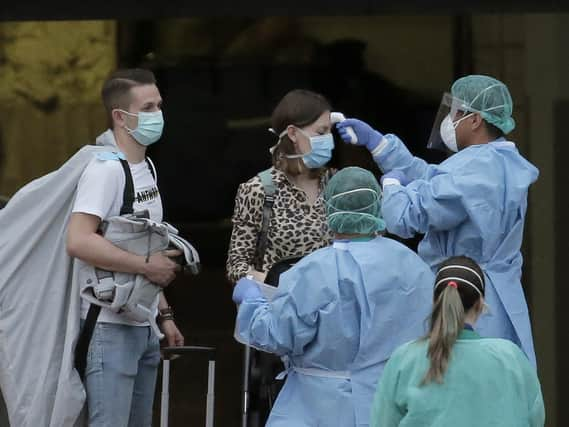Coronavirus: Who can get tested for covid-19 in Yorkshire, how you can book a test and what is involved


In a bid to reach its target of 100,000 tests a day, the Government has dramatically expanded the list of people who are eligible for coronavirus tests in England.
Earlier this month, key workers and anyone in their household were able to access testing if they were showing symptoms.
Advertisement
Hide AdAdvertisement
Hide AdHealth Secretary Matt Hancock said the Government was on track to meet the goal of 100,000 tests a day and now had the capacity to carry out more than 70,000 tests a day.
Here is what you need to know about who is eligible for tests and where to access them:
- Who can be tested?
The Government has said that the priority will still be to test patients, but in England essential workers with symptoms of coronavirus and the people who live with essential workers and have symptoms were able to get tested from Friday.
From Wednesday, testing will be available to all frontline workers in health and social care, even if they are not displaying symptoms.
Advertisement
Hide AdAdvertisement
Hide AdTesting will also be expanded to NHS patients and residents in care homes regardless of whether they have symptoms.
All other essential workers, and the people they live with, can get tested if they have symptoms.
People aged over 65 and their households can get tested if they are showing symptoms, as well as anyone who goes into work because they cannot work from home and their households if they have symptoms.
Mr Hancock said: "From construction workers to emergency plumbers, from research scientists to those in manufacturing, the expansion of access to testing will protect the most vulnerable and help keep people safe."
- What are essential workers?
Advertisement
Hide AdAdvertisement
Hide AdThe Government has published a list of essential workers which includes all NHS and social care staff from doctors, nurses, midwives, paramedics, social workers and carers to support staff and supply chain workers.
Workers such as teachers, firefighters, local and national government staff, supermarket staff, police and delivery drivers are just some of the other roles included on the list.
- How do I arrange a test?
Essential workers can book for a test at one of more than 40 regional drive-through sites or request a home test kit.
However, the Government has stressed these kit numbers will initially be limited but "more will become available".
Advertisement
Hide AdAdvertisement
Hide AdEssential workers who are self-isolating can also be registered and referred for coronavirus testing by their employer.
Testing is most effective within three days of symptoms - a high temperature or new continuous cough - developing, Government guidelines state.
- Where will the tests take place?
The Government said it is planning to open 50 drive-through testing sites by the end of April, with the aim that most people will not have to drive for more than 45 minutes to get to a regional testing site.
Some 41 drive-through centres are currently in place with a further 48 going live this week, Mr Hancock said.
Advertisement
Hide AdAdvertisement
Hide AdA delivery service for home testing kits has been designed with industry partners, including Royal Mail and Amazon.
Mr Hancock said the availability of home tests is expanding from 5,000 kits per day to 25,000 a day by the end of the week.
The Army is currently running 17 mobile testing centres which are travelling around the country, but the plan is to increase this to 70 by the end of the week, Mr Hancock said.
Packages of satellite test kits are being sent directly to care homes across England to enable testing of symptomatic residents.
- What does the test involve?
Advertisement
Hide AdAdvertisement
Hide AdThe test involves taking a swab of the nose and the back of the throat, and can be done by the person themselves or by someone else.
- What happens next?
Completed samples will be sent to a testing laboratory where they are analysed.
The Government said that it is aiming for tests from drive-through sites to be sent out by text within 48 hours and home testing kit results within 72 hours of collection.
People will be given advice on any next steps that need to be taken after receiving their results.
Editor’s note:
Advertisement
Hide AdAdvertisement
Hide AdFirst and foremost - and rarely have I written down these words with more sincerity - I hope this finds you well.
Almost certainly you are here because you value the quality and the integrity of the journalism produced by The Yorkshire Post’s journalists - almost all of which live alongside you in Yorkshire, spending the wages they earn with Yorkshire businesses - who last year took this title to the industry watchdog’s Most Trusted Newspaper in Britain accolade.
And that is why I must make an urgent request of you: as advertising revenue declines, your support becomes evermore crucial to the maintenance of the journalistic standards expected of The Yorkshire Post. If you can, safely, please buy a paper or take up a subscription. We want to continue to make you proud of Yorkshire’s National Newspaper but we are going to need your help.
Postal subscription copies can be ordered by calling 0330 4030066 or by emailing [email protected]. Vouchers, to be exchanged at retail sales outlets - our newsagents need you, too - can be subscribed to by contacting subscriptions on 0330 1235950 or by visiting www.localsubsplus.co.uk where you should select The Yorkshire Post from the list of titles available.
Advertisement
Hide AdAdvertisement
Hide AdIf you want to help right now, download our tablet app from the App / Play Stores. Every contribution you make helps to provide this county with the best regional journalism in the country.
Sincerely. Thank you.
James Mitchinson
Editor